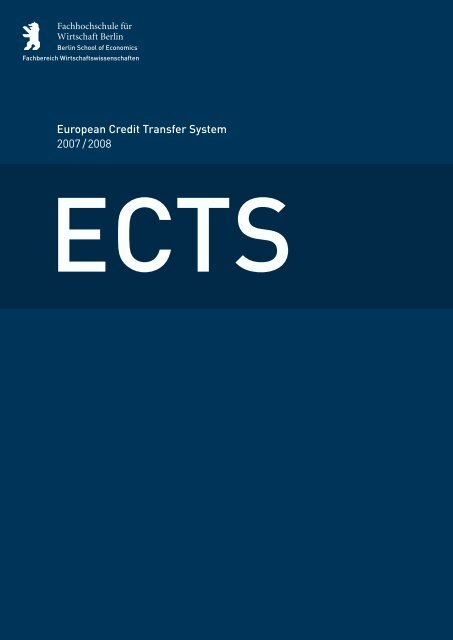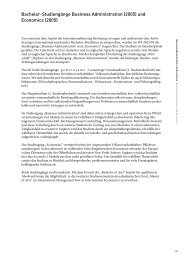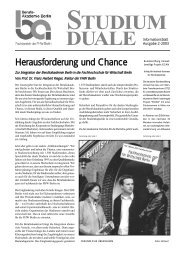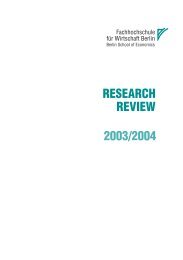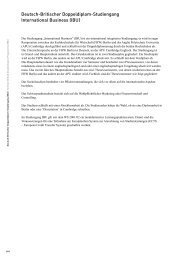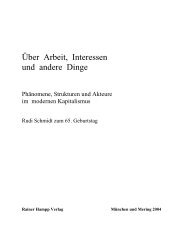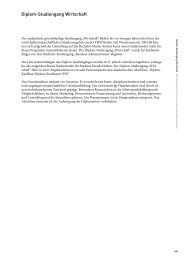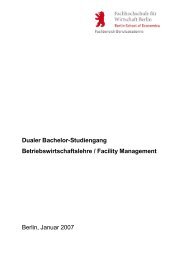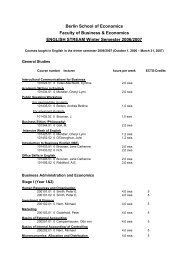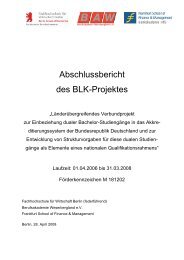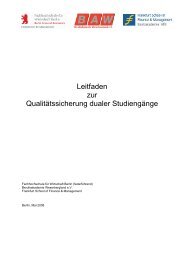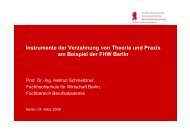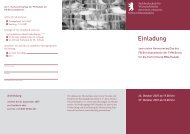European Credit Transfer System 2007 / 2008
European Credit Transfer System 2007 / 2008
European Credit Transfer System 2007 / 2008
Create successful ePaper yourself
Turn your PDF publications into a flip-book with our unique Google optimized e-Paper software.
Fachbereich Wirtschaftswissenschaften<br />
<strong>European</strong> <strong>Credit</strong> <strong>Transfer</strong> <strong>System</strong><br />
<strong>2007</strong> / <strong>2008</strong><br />
ECTS
Inhalt<br />
Content<br />
Allgemeine Information<br />
General Information<br />
– Vorwort<br />
Preface<br />
– Ausländische Kooperationspartner<br />
Foreign Partner Universities<br />
– Einführende Hinweise<br />
Introductory Comments and Advice<br />
– Allgemeine Einführung in das ECTS<br />
General Introduction to the ECTS Programme<br />
– Berlin<br />
Berlin<br />
– Die Fachhochschule für Wirtschaft (FHW) Berlin /<br />
Fachbereich I Wirtschaftswissenschaften<br />
Faculty of Business and Economics /<br />
Berlin School of Economics<br />
– Andere wichtige Einrichtungen an der FHW Berlin<br />
Other Important Facilities at the FHW Berlin<br />
– Lehrangebot der FHW Berlin<br />
Studies at the FHW Berlin<br />
– Allgemeine praktische Hinweise<br />
Other Relevant Information<br />
English Stream<br />
English Stream<br />
Studium Generale<br />
Supplementary Courses<br />
Business Administration (Bachelor)<br />
Economics (Bachelor)<br />
Diplom-Studiengang Wirtschaft<br />
Business Administration<br />
3<br />
31<br />
3<br />
31<br />
5<br />
33<br />
7<br />
35<br />
8<br />
36<br />
11<br />
39<br />
13<br />
41<br />
17<br />
45<br />
19<br />
47<br />
26<br />
54<br />
59<br />
59<br />
61<br />
61<br />
103<br />
281<br />
282<br />
Inhalt Content
Preface<br />
Welcome to the Berlin School of Economics! I am pleased to learn<br />
that you are interested to become a student at our school and I would<br />
specifically appreciate your final decision to join us. Please make use<br />
of the rich and profound supply of our academic courses – and do<br />
not forget the numerous opportunities which the vibrant city of<br />
Berlin offers!<br />
The Berlin School of Economics is quite unique in Germany. It is<br />
characterised by 35 different pathways of business and economic<br />
studies which cover the total area of international economics and<br />
business, and relevant related sciences as well. Given the number of<br />
graduates that turn out each year, we are one of the major academic<br />
training institutions for future business leaders and managers in<br />
Germany. The Berlin School of Economics has established itself as a<br />
provider of high-quality undergraduate and postgraduate business and management education and as a<br />
result achieves high rankings among German universities. One of the characteristics of this specialized<br />
business school is the practice-related approach which applies to all study programmes and teaching.<br />
The Berlin School of Economics comprises two departments of which one is solely dedicated to company-linked<br />
programmes. Additionally the postgraduate courses of further education are taken together<br />
in the Institute of Management Berlin (IMB). We were one of the first academic institutions in Berlin<br />
to transform the former Diploma studies into the new <strong>European</strong> Bachelor and Master format and have<br />
been offering MBA-programmes for more than 15 years.<br />
There are some 145 professors teaching in various disciplines such as business administration and economics,<br />
sociology and law as well as business information, mathematics, statistics and engineering. The<br />
academic staff is supplemented by 400 associate lectures who significantly contribute their day-to-day<br />
business experience. Currently there are 5,000 students from 60 countries enrolled at the Berlin School<br />
of Economics. 1,000 students graduate each year with a Bachelor’s, Master’s or German Diplom degree.<br />
A university specialised in management studies and economics is particularly influenced by the changes<br />
of its international environment. The present state of globalisation with its dramatic increase in crossborder<br />
trade, capital and technology flows bears the major impact on the strategy which Berlin School<br />
of Economics adheres to. One specific aspect of these global links is the growing network of international<br />
partnerships between universities. The Berlin School of Economics holds more than 60 active partnerships<br />
with universities around the world. These contacts reach from Amsterdam via Dublin, Paris,<br />
Zaragoza and St. Petersbourgh, Singapore, Buenos Aires, Otaru, Sydney and as far as Honululu. In addition,<br />
we have joined the consortium of seven Universities of Applied Sciences (UAS7) who agree among<br />
themselves to establish an „Alliance for Excellence” in terms of quality and internationalisation.<br />
In order to enhance the international cooperations and not least to enrich the qualification of our students,<br />
the Berlin School of Economics has established and English Stream which allows participants to<br />
attend lectures and choose courses in a growing number of modules in English. Existing partnerships<br />
with foreign academic institutions are further strengthened through international Summer Schools.<br />
Foreign students, especially those from partner universities, may get a first insight to the Berlin School<br />
of Economics during German language or subject related courses in English each lasting between two<br />
and four weeks.<br />
Quite indispensable for a good success in our international links has been the transformation of our<br />
traditional structure of studies, teaching and examinations according to the <strong>European</strong> <strong>Credit</strong> <strong>Transfer</strong><br />
<strong>System</strong> (ECTS). The latter has developed into the universally accepted method of accumulation and<br />
transfer of credits within the <strong>European</strong> Area of Higher Education. Berlin School’s first ECTS handbook<br />
General Information<br />
31
General Information<br />
32<br />
had been submitted as early as the academic year of 1998/99, well even before the Bologna declaration.<br />
The most recent 10th edition, which we present to you now, relates to academic <strong>2007</strong>/<strong>2008</strong>. Because of<br />
the yearly publication we were able to permanently and sustainably improve the reliability of international<br />
exchanges for students and international partner schools. As a matter of fact, the ECTS reaches<br />
out beyond a simple transfer and accumulation mechanism alone: At the same time it can structure<br />
established academic pathways, facilitate comparisons between academic institutions and improve the<br />
conditions of studies because it directs the attention to the work loads which students might bear.<br />
This particular ECTS handbook turned out to be quite a big volume because our school is able to offer<br />
a large number of innovations as a result of the transformation to the Bachelor and Master format and<br />
the commencement of new study pathways, which have received budgetary support from the Berlin<br />
Structural Fund of Innovations. These more than compensate for the discontinuing diploma studies<br />
which they will gradually replace.<br />
I kindly encourage you to make use of these opportunities! Please, do look beyond the boundaries of<br />
the specific study programme which you have chosen some time ago, and discover new topics which<br />
are presented in the “Studium Generale”, structured seminar sequences (“Ringvorlesungen”), colloquia<br />
and the career contact exercises.<br />
Please try to open up to your fellow students and get into contact. Our school can only be as good as<br />
our students are. I trust on your personal interest and involvement!<br />
I want to acknowledge the supporting services of all my colleagues for this new edition. Very many<br />
module descriptions had to be adapted and occasionally to be newly developed. My special thanks are<br />
directed to Mr. Andreas Hirsch-Landau, for all his co-ordinating and editorial efforts.<br />
Good success with your studies at the Berlin School of Economics!<br />
Sincerely yours,<br />
Michael Tolksdorf<br />
Vice President of the Berlin School of Economics
Foreign Partner Universities<br />
Argentina Buenos Aires Universidad Torcuato Di Tella<br />
Buenos Aires Universidad Argentina de la Empresa<br />
Australia Townsville James Cook University<br />
Belgium Leuven Katholieke Hogeschool Leuven<br />
Brazil Blumenau Universidade Regional de Blumenau<br />
São Paulo State University of Campinas<br />
Chile Santiago de Chile Universidad Mayor Santiago de Chile<br />
China Chengdu Southwestern University of Finance and<br />
Economics<br />
Nanchang Jiangxi University of Finance and Economics<br />
Denmark Aalborg Aalborg Universitet<br />
Kopenhagen Copenhagen Business School<br />
Finland Vantaa EVTEK School of Business Administration<br />
France Paris Ecole Supérieure du Commerce Extérieur<br />
(ESCE)<br />
Rennes Ecole Supérieure du Commerce (ESC)<br />
Angers Ecole Supérieure des Sciences Commerciales<br />
d’Angers (ESSCA)<br />
Lyon Université Catholique de Lyon / ESDES Business<br />
School<br />
Greece Athen Athens University of Economics and Business<br />
Great Britain Bristol University of the West of England (UWE), Bristol<br />
Business School<br />
Cambridge Anglia Ruskin University<br />
Hatfield University of Hertfordshire<br />
London South Bank University<br />
Portsmouth University of Portsmouth<br />
Sheffield Sheffield Hallam University<br />
Ireland Dublin Dublin Institute of Technology<br />
Waterford Waterford Institute of Technology<br />
Italy Bergamo Università degli Studi di Bergamo<br />
Catania Università degli Studi di Catania<br />
Japan Otaru Otaru University of Commerce<br />
Kobe Kobe University<br />
Canada Kelowna Okanagan College<br />
Mexico Monterrey Universidad de Monterrey (UDEM)<br />
General Information<br />
33
General Information<br />
34<br />
The Netherlands Amsterdam Hogeschool voor Economische Studies (HES)<br />
Diemen INHOLLAND University Diemen<br />
Groningen Hanze University Groningen<br />
Haarlem INHOLLAND University Haarlem<br />
Sittard Hogeschool Zuyd<br />
Norway Trondheim Sör-Trondelag University College,<br />
Trondheim Business School<br />
Austria Wien FHW Wien<br />
Eisenstadt Fachhochschul-Studiengänge<br />
Burgenland GmbH<br />
Internationale Wirtschaftsbeziehungen<br />
Poland Poznan Wyzsza Szkola Bankowa Poznan –<br />
Poznan School of Banking<br />
Warschau Warsaw School of Economics<br />
Russia St. Petersburg St. Petersburger Staatsuniversität für<br />
Ökonomie und Finanzen<br />
Switzerland Winterthur Zürcher Hochschule Winterthur (ZHW)<br />
Singapur Singapur Nanyang Technical University<br />
Spain Alicante Universidad de Alicante<br />
Bilbao Universidad del País Vasco, Bilbao<br />
Las Palmas Universidad de Las Palmas de Gran Canaria<br />
Vitoria-Gasteiz Universidad del País Vasco, Vitoria-Gasteiz<br />
Zaragoza Universidad de Zaragoza<br />
South Africa Johannesburg University of the Witwatersrand<br />
South-Korea Seoul Sungkyunkwan University<br />
Tschechische Republic Prag University of Economics<br />
Turkey Izmir Ege University<br />
Istanbul Boğaziçi University<br />
Istanbul Marmara University<br />
Hungary Budapest International Business School (IBS)<br />
Budapest Ecole Supérieure des Sciences Commerciales<br />
d’Angers (ESSCA) – Campus Budapest<br />
USA Wichita / Kansas Wichita State University<br />
Honolulu / Hawaii Hawaii Pacific University<br />
Fresno / Kalifornien California State University / Craig School of<br />
Business<br />
East Bay/California California State University East Bay<br />
Missoula/Montana University of Montana<br />
Buffalo/New York Canisius College/Wehleschool of Business
Introductory Comments and Advice<br />
In contrast to the publications of other universities, a category „Requirements“ or „Prerequisites“ has<br />
not been included since a freedom of study choice is common practice at the FHW Berlin. This means<br />
that students are completely free in the organisation of their study schedules; the so-called „Musterbelegungsplan“<br />
(model study schedule) suggested by the university is to be seen as a recommendation, not<br />
legally binding.<br />
Besides the study programmes listed in the ECTS-brochure, the FHW Berlin offers further courses.<br />
Not included are the postgraduate study programmes: “MBA General Management – Dual Award”,<br />
“MBA <strong>European</strong> Management”, “MBA <strong>European</strong>-Asian Programme”, “MBA Entrepreneurial Management”,<br />
“MBA Health Care Management”, “Labour Policies and Globalisation” as well as the postgraduate<br />
certificate programmes “Environmental and Quality Management” and “Macroeconomic Policy Studies”.<br />
These programmes cannot be attended by exchange students. Only a limited number of exchange<br />
students will be accepted for the study programmes “Management International – German-French<br />
Study Programme (DFS)”, “International Business (IBU)” and “Business Engineering in Environmental<br />
Science”.<br />
The courses of the “Studium Generale” (supplementary courses) are only listed with their title. In the<br />
“Studium Generale” no assessment is intended. Therefore, credits can only be awarded when the student<br />
voluntarily provides some form of graded assessment.<br />
Reorganisation of Study Programmes<br />
In 1999, the <strong>European</strong> Secretary of Education signed a declaration to create a common basis for the <strong>European</strong><br />
higher education system. The “Bologna Declaration” aims to reorganise the existing educational<br />
system by implementing Bachelor and Master programmes until 2010. Thereby, internationally accepted<br />
university degrees will be established and a better comparability will be achieved. As from winter semester<br />
2005/06, the following study programmes will be replaced by Bachelor courses for students beginning<br />
their higher education:<br />
Business Administration (Diploma) Business Administration (Bachelor)<br />
Business Engineering in Environmental Science Business Engineering –<br />
(German Diploma) Environment and Sustainability (Bachelor)<br />
General Information<br />
35
General Information<br />
36<br />
General Introduction to the ECTS Programme<br />
What is ECTS?<br />
ECTS stands for the <strong>European</strong> <strong>Credit</strong> <strong>Transfer</strong> <strong>System</strong>. It was developed by the Commission of the<br />
<strong>European</strong> Union under the ERASMUS Programme (<strong>European</strong> Action Scheme for the Mobility of University<br />
Students) in order to provide common procedures to guarantee academic recognition of studies<br />
abroad. It provides a way of measuring and comparing learning achievements, and transferring them<br />
from one institution to another.<br />
ECTS is a decentralised system based upon the principle of mutual trust and confidence between the<br />
participating institutions.<br />
The core elements of ECTS are:<br />
– Information on lectures available and student achievements<br />
– Mutual agreement between the partner institutions and the students<br />
– The use of ECTS <strong>Credit</strong>s to indicate student workload<br />
These principles are set to reinforce the mutual confidence.<br />
What does ECTS offer to the student?<br />
Students participating in the ECTS will receive full credit for all academic work successfully carried out<br />
at any of the ECTS partner institutions and they will be able to transfer these academic <strong>Credit</strong>s from one<br />
participating institution to another on the basis of prior agreement between the institutions involved.<br />
All students of the participating programmes who want to take part in ECTS may do so if their institution<br />
agrees and the respective places are still available.<br />
Students who want to spend one semester or more abroad will have to recognize that they are offered a<br />
relevant study programme that is similar to their own. They also will look for a full academic recognition<br />
that enables the continuation and completion of their studies at the home institution.<br />
ECTS guarantees this academic recognition of the study achievements made abroad. ECTS enables the<br />
student to regular courses. They therefore participate equally in the university life and study programme<br />
offered at the guest institution.<br />
Most ECTS students will go to one particular partner institution within the EU Member States, study<br />
there for a certain time and then continue their studies at their home institution. Some may also decide<br />
to stay at the partner institution, possibly to gain a degree there. Others may proceed to a third institution<br />
to continue their studies. In each of these cases, students will be required to comply with the legal<br />
and institutional requirements of the country and institution where they pursue their degree.<br />
When the students return to their home institution and have successfully completed the study programme<br />
previously agreed upon between the home and the host institution, credit transfer will take<br />
place at the home institution without any loss of time or credit. If, on the other hand, the students decide<br />
to stay at the partner institution and pursue a degree there, they may have to adapt their studies due<br />
to the legal, institutional and departmental rules in the host country, institution and department.
Students selected by each institution to participate in the ECTS may be awarded a student mobility<br />
grant if they fulfil the general conditions of eligibility for the ERASMUS grant. The conditions in survey:<br />
– Students must be citizens of one of the EU Member States or citizens of the EFTA countries (or recognised<br />
by one of the EU Member States or one EFTA country as having an official status of refugee<br />
or stateless person or permanent resident); as for the EFTA nationals, students will be eligible provided<br />
they are moving within framework of ERASMUS from the respective EFTA home country to<br />
an EU Member State.<br />
– The students shall not be required to pay tuition fees at the host institution; the students may, however,<br />
be required to pay their normal tuition fees to the home institution during the study period<br />
abroad.<br />
– The national grant/loan to which a student may be entitled for study at his or her institution may be<br />
discontinued, interrupted or reduced while the student is studying in another Member State during<br />
the study period abroad. and entitled to an ERASMUS grant<br />
– One study period abroad should not last less than three months or more than one year.<br />
ECTS <strong>Credit</strong>s<br />
The courses are not only described in terms of content but also by adding <strong>Credit</strong>s. These <strong>Credit</strong>s represent<br />
the student workload for the respective course and therefore not only refer to the number of lectures<br />
per week. Simultaneously, they reflect the quantity of work each course requires in relation to the<br />
quantity of work required to complete a full year of study at the University of Applied Sciences.<br />
The workload encompasses lectures, practical placements, seminars, self-study – in the library or at<br />
home – and examinations or other assessment activities. Therefore, ECTS <strong>Credit</strong>s express a relative<br />
value.<br />
In ECTS, usually 60 <strong>Credit</strong>s are given for a year of study, i.e. 30 <strong>Credit</strong>s per semester. The participating<br />
higher education institutions subdivide the <strong>Credit</strong>s for the various courses dependent on the workload<br />
required to complete them. Practical placements and mandatory optional subjects which are part of the<br />
studies also receive <strong>Credit</strong>s.<br />
It is important that no special courses are set up for ECTS purposes, but that all ECTS courses are mainstream<br />
courses of the participating institutions as followed by home students under normal regulations.<br />
<strong>Credit</strong>s are awarded only when the course has been completed and all required examinations have been<br />
successfully taken.<br />
ECTS Evaluation Table<br />
Examination results and other assessments are usually marked and graded. Due to the existence of the<br />
different <strong>European</strong> grading systems, the ECTS Evaluation table was developed as a means to transfer<br />
the respective marks and grades into their own system. This table adds some information, but does not<br />
replace the grades earned at the home institution. The individual higher education institution decides<br />
upon transferring the ECTS Evaluation table into its own grading system. Please, see above on page 55.<br />
General Information<br />
37
General Information<br />
38<br />
ECTS Key Documents<br />
a. Learning Agreement<br />
The Learning Agreement describes the programme of studies abroad and is drawn up by the individual<br />
student and the institutions involved before the student goes abroad. If necessary, the Learning<br />
Agreement can be modified according to the needs of the respective host university. This is, when<br />
both partner institutions agree.<br />
b. Transcript of Records<br />
The Transcript of Records (ToR), shows the learning achievements of the student prior to and after<br />
the period of study abroad. The Transcript of Records does not only list the ECTS <strong>Credit</strong>s accumulated<br />
by the individual student for having successfully participated in certain courses but does also<br />
give the grade awarded according to the local grading scale and the ECTS grading scale. The combination<br />
of the local grades and the ECTS <strong>Credit</strong>s and Grades represents qualitatively and quantitatively<br />
the performance of the student on the courses at the host institution.<br />
These tools are used by the institutional and departmental co-ordinators, appointed by each institution<br />
to deal with the administrative and academic aspects of ECTS. It is their role to advise and counsel students<br />
who wish to participate in ECTS.<br />
By using ECTS, transparency of curricula and students’ learning achievements is created, which in turn<br />
facilitates academic recognition.<br />
Grants<br />
In the framework of the ERASMUS mobility programme, <strong>European</strong> students may apply for a grant. For<br />
further information, please contact the ERASMUS co-ordinator at your institution.<br />
Students in the first year of their studies are not eligible for receiving ERASMUS grants.<br />
More information on ECTS is available on the Internet:<br />
http://ec.europa.eu/dgs/education_culture/publ/pdf/ects/de.pdf
Berlin<br />
General Information<br />
Berlin, the capital of Germany, with its population of some 3.5 million, is the largest city in Germany,<br />
seat of the Federal Government and the Parliament. In no other city in Germany is the process of reunification<br />
and the merging of East and West as evident as here. Moreover, Berlin is an international city in<br />
which many different cultures live side by side. This multi-cultural trait is a fundamental feature which<br />
has always been affiliated with Berlin and is an important element of its attractiveness for people from<br />
all over the world.<br />
Berlin is not an industrial centre, but a metropolis of science, culture, media and services. In Germany’s<br />
largest university city students study at four public universities, three art colleges, eight universities of<br />
applied sciences and three other institutions of higher education. In addition, numerous research centres<br />
shape the academic scene.<br />
Berlin is a green city: parks in all city districts, lakes within the city, forests, castle gardens and outdoor<br />
restaurants and cafés offer all city residents recreational pleasures.<br />
The city also offers a varied and diverse programme of culture. In addition to several operas, theatres,<br />
museums, libraries and numerous cinemas, the metropolis also has a wide off-culture with its own locations<br />
and events. Highlights of Berlin are, among others, the ‘Berlin marathon’ in the fall, the ‘Carnival<br />
of Cultures’ and the street festivals in the various districts in summer. The city is fascinating in every<br />
way; new Berliners should take time to discover everything Berlin has to offer.<br />
For information and programmes find details on the internet under:<br />
http://www.berlin.de<br />
General Information<br />
39
General Information<br />
40<br />
Travelling to Berlin<br />
There are many ways to get to Berlin. The capital can be easily reached by airplane, rail or car. Here is a<br />
short overview of the different options:<br />
Berlin has two international airports, Tegel and Schönefeld, which are both well connected to the public<br />
transport system. From Airport Tegel, the buses 109 or X9, and from Airport Schönefeld, the city and<br />
suburban railway take you right downtown. In addition, there are, of course, many taxis at your disposal<br />
at both airports.<br />
Berlin can also be comfortably reached by railway. A number of high-speed German ICE trains travel<br />
daily to and from Berlin. The German Rail Company, the Deutsche Bahn AG (DB), offers a special reservation<br />
system with which you can save up to 40 % when booking a trip over the weekend and seven<br />
days in advance. In addition, there are a number of other special price reductions which the Deutsche<br />
Bahn offers on local and regional trains: www.bahn.de<br />
Six motorways are leading to and through Berlin. The motorways all join the ‘Berliner Ring’ motorway<br />
which circles the city.<br />
Public Transport<br />
Berlin has an excellent public transport system which is operated by the Berlin Public Transport Authority,<br />
Berliner Verkehrsbetriebe (BVG). The suburban railway system, S-Bahn, and the underground<br />
system, U-Bahn, is extensive and reaches into the countryside surrounding Berlin.<br />
Students in Berlin use the so-called Semesterticket. All students of the FHW Berlin/Berlin School of<br />
Economics are included in the Semesterticket system. Guest students are asked to transfer the amount<br />
of EUR 185.18, resp. EUR 236.31 for Double Degree students and Free Mover students net (all bank<br />
fees have to be covered) to the account of the FHW Berlin before their arrival:<br />
Account Holder: Fachhochschule für Wirtschaft Berlin, 10825 Berlin<br />
Account: Deutsche Bank (Swiftcode: DEUTDEBB) (IBAN-Code: DE50100700000068599000)<br />
Account No. 06 85 99 000<br />
Bank Account Reference No.: 100 700 00<br />
Reference of Payment: First Name + Family Name + “GAST”<br />
A ticket valid for six month for all public transport vehicles of the BVG is included in this amount. If<br />
guest students wish to stay for two semesters they are asked to pay the amount once more at the end of<br />
their first semester.<br />
After the arrival in Berlin the guest students will get the Student Identity Card of the FHW Berlin and<br />
on this card the Semesterticket is printed which is valid for the ABC region in and around Berlin (except<br />
Potsdam) from summer semester 1 October to 31 March or winter semester 1 April to 30 September.<br />
Students attending the Intensive German Language Course prior to the beginning of the semester<br />
have to buy a weekly or monthly ticket separately. On all rides with vehicles on the Public Transport<br />
<strong>System</strong> this Student ID together with a valid passport with photo has be carried with the students.
Fachhochschule für Wirtschaft (FHW) Berlin /<br />
Berlin School of Economics<br />
Faculty of Business and Economics<br />
Address<br />
Fachhochschule für Wirtschaft Berlin / Berlin School of Economics<br />
Faculty of Business and Economics<br />
Badensche Str. 50–51, 10825 Berlin<br />
Phone: +49 (0)30 85789-0<br />
Fax: +49 (0)30 85789-199<br />
Internet: www.fhw-berlin.de<br />
General Information<br />
41
General Information<br />
42<br />
General Information<br />
The Fachhochschule für Wirtschaft (FHW) Berlin, a public university of applied sciences, was founded<br />
in 1971 as the successor institution to the Wirtschaftsakademie. In terms of its high number of graduates,<br />
it has developed into one of the largest academic centres for business and management training in<br />
Germany. The university is located close to the centre of Berlin, next to the world-famous Schöneberg<br />
Town Hall, the seat of government and parliament of former West Berlin. It was here that the former<br />
US President, John F. Kennedy, made his famous speech in which he said ‘Ich bin ein Berliner!’. Just five<br />
minutes away, the beautiful Volkspark, a green recreation area, beckons the visitor to relax and stroll.<br />
Since the integration of the Faculty of Company-Linked Programmes in 2004, a total of approximately<br />
4.800 students are currently enrolled at the FHW Berlin. The university has a significant international<br />
profile evidenced by over 63 agreements of co-operation with foreign partner universities in Western<br />
and Eastern Europe, North America, Latin America, Australia, Japan and China. Approximately 100<br />
professors and 300 lecturers teach at the FHW Berlin. The lecturers are primarily active in industry and<br />
teach at the FHW Berlin as a sideline.<br />
The FHW Berlin currently offers within the Faculty of Business and Economics 10 Bachelor, 2 Diplom-<br />
undergraduate study programmes as well as four Master’s programmes. Within the Europe-wide Bologna<br />
Process the FHW Berlin has been transforming its study programmes which are now leading to<br />
a Bachelor’s or Master’s degree. For this reason, the study course Business leading to a German Diplom<br />
and the study course Business Engineering in Environmental Science will expire. The newly designed<br />
undergraduate Bachelor programmes “Business Administration” and “Business Engineering – Environment<br />
and Sustainability” will take their place.<br />
The Faculty of Company-Linked Programmes solely offers 14 company-linked study programmes<br />
which also lead to a Bachelor’s degree.<br />
The postgraduate study programmes, including five MBA programmes, have been joined in the “Institute<br />
of Management Berlin” (IMB) which was set up in the summer of 2004.<br />
The Academic Year<br />
Duration winter semester: 1 October <strong>2007</strong>–31 March <strong>2008</strong><br />
Lectures winter semester : 4 October <strong>2007</strong>–16 February <strong>2008</strong><br />
Duration summer semester: 1 April <strong>2008</strong>–30 September <strong>2008</strong><br />
Lectures summer semester: 1 April <strong>2008</strong>–21 July <strong>2008</strong><br />
Please note: Intensive German Language Course starts three weeks prior to the semester.<br />
ERASMUS University Coordinator and ECTS University Coordinator<br />
ERASMUS University Co-ordinator ECTS University Co-ordinator<br />
Susanne Fürstenberg Prof. Dr. Laila Maija Hofmann<br />
Room: 58 Room: 254<br />
Phone: +49 (0)30 85789-261 Phone: +49 (0)30 85789-448<br />
Fax: +49 (0)30 85789-269 Fax: +49 (0)30 85789-199<br />
E-mail: fuerstenberg@fhw-berlin.de E-mail: lhofmann@fhw-berlin.de
International Office of the FHW Berlin<br />
The International Office assists exchange students in all matters concerning their studies and the organisation<br />
of their stay in Berlin. Additionally the office provides support with accommodation in student<br />
residence halls, organisation of a Intensive German Language Course and enrollment at FHW Berlin.<br />
Contact Details of the International Office<br />
Katrin Mahnkopf (Incoming Officer)<br />
Room: 56<br />
Phone: +49 (0)30 85789-260<br />
Fax: +49 (0)30 85789-269<br />
E-mail: incoming@fhw-berlin.de<br />
Ingrid Sperber<br />
Room: 57<br />
Phone: +49 (0)30 85789-275<br />
Fax: +49 (0)30 85789-269<br />
E-mail: isperber@fhw-berlin.de<br />
Susanne Fürstenberg<br />
Room: 58<br />
Phone: +49 (0)30 85789-261<br />
Fax: +49 (0)30 85789-269<br />
E-mail: fuerstenberg@fhw-berlin.de<br />
Katja Zühlsdorf<br />
Room: 56<br />
Phone: +49 (0)30 85789-120<br />
Fax: +49 (0)30 85789-129<br />
E-mail: summer@fhw-berlin.de<br />
Office Hours:<br />
Mondays: 10.30am–11.30am, Tuesday: 10.30am–12.30am, Wednesday: 10.30am–12.30pm,<br />
Thursday: 2pm–4pm and upon prior appointment<br />
International Network for Alumni (INA)<br />
INA is the International Alumni Organisation of the Berlin School of Economics. Members are recruited<br />
out of all international students who have been studying for minimum one year at the BSE, professors<br />
and all persons related to the BSE. INA’s main business is to create a network, helping to keep in<br />
touch with each other, offering contacts to other alumni. Please find more information on the internet<br />
at www.fhw-berlin.de/ina. From the summer on INA allows you to follow summer courses for international<br />
alumni.<br />
General Information<br />
43
General Information<br />
44<br />
INAktion – The International Office Counselling Service<br />
To offer a platform for questions and problems of international students during their stay in Berlin<br />
INAktion was established. INAktion offers regular office hours. Regularly during the semester an event<br />
is offered for ERASMUS students and international full-time students. The office hours for international<br />
students are to be found in the International Office. The leisure programme of INAktion includes cultural,<br />
sports and social events as well as excursions. In addition, INAktion organises a so called Buddy<br />
Programme. Students of the FHW Berlin accompany guest students, assist them in getting their studies<br />
organised and getting around in Berlin.<br />
Enrolment<br />
The enrollment of guest students is coordinated through the International Office. It is essential that the<br />
deadlines for the enrollment are met. The application deadline for the summer semester is November 15th,<br />
the winter semester it is June 15th. The student identity card entitles the student to discounts on cultural<br />
events, cinemas, clubs and to reduced prices in all Berlin refectories.<br />
All international guest students wishing to attend lectures held in German should have sufficient German<br />
language skills in order to be able to follow studies at the FHW Berlin. In addition, special German<br />
language courses will be offered to all exchange students. The application forms and details about the<br />
enrollment can be downloaded from the web-page of the International Office on<br />
http://www.fhw-berlin.de/fhw2000/english/index_english.htm<br />
Orientation Week<br />
Every semester an orientation week will be organised for all new students. This takes place in the first<br />
week of the semester. During this week students receive general information about studying at the<br />
FHW Berlin. Exchange students should take part in some of the events since not only the contents of<br />
courses offered are presented, but those gatherings also offer the chance to meet other (German) students<br />
and lecturers.<br />
In addition, the International Office holds an introductory International Induction Day for exchange<br />
students during or shortly before the orientation week. On this day the guest students get a tour of<br />
Berlin and will be introduced to German students. Together with the Student Counselling Office the<br />
International Office gives an introduction to the study program at the FHW Berlin and offers first hand<br />
individual counselling. This week usually ends with a Welcome Party for the guest students.<br />
International Summer School<br />
Similar to the Anglo-American system of summer schools or summer sessions, the International<br />
Summer School offers international students the possibility to enrol in courses at the Berlin School<br />
of Economics for a short period of time. The courses are aimed at students of partner institutions but<br />
are also open to students from other universities. During three to four intensive weeks, the language<br />
and academic courses will be complemented by a comprehensive cultural and extra-curricular activity<br />
program. The language courses called “Learn the Language, Understand the Culture, Experience Berlin”<br />
combine language, cultural and historical elements, and thus want to intensify the character of the<br />
course. The academic courses “Markets and Management in Europe” and „<strong>European</strong> Business and Economic<br />
Program“ is completely taught in English and focuses on politics and economics of Germany and<br />
Europe, on cross-cultural management, as well as on marketing for the media and automotive industry.<br />
The curricula also includes several company visits. Another academic summer course is likely to be offered<br />
in the summer of <strong>2007</strong>. In the summer semeser <strong>2007</strong> you can also follow courses for international<br />
students in the FHW Berlin.
Other Important Facilities at the FHW Berlin<br />
Student Counselling<br />
Marion Senf-Denker<br />
Room: 54<br />
Phone: +49 (0)30 85789-254<br />
Fax: +49 (0)30 85789-269<br />
E-mail: studinfo@fhw-berlin.de<br />
At the Student Counselling Office students can seek advice in connection with their studies at the FHW<br />
Berlin. In the case that problems occur, the Student Counsellor will provide assistance.<br />
career contact<br />
career contact is an area of work of the Student Counselling and Service department. The career contact<br />
offers professional-qualified trainings each time in the holidays. The participants have to attend a certain<br />
number of the trainings to be awarded a certificate. The trainings include management training, conflict<br />
management and intercultural training.<br />
Women’s Representative<br />
Viola Philipp Sabine Keibel, Mitarbeiterin<br />
Room: 126 Room: 128<br />
Phone: +49 (0)30 85789-231 Phone: +49 (0)30-85789-232<br />
Fax: +49 (0)30 85789-239<br />
E-mail: frauenbeauftragte@fhw-berlin.de E-mail: skeibel@fhw-berlin.de<br />
The office of the Women’s Representative was established at all Berlin universities in order to counteract<br />
discrimination against women. The Women’s Representative is responsible for all groups at the university,<br />
including students. Should questions or problems arise, each student may approach the Women’s<br />
Representative for counselling.<br />
Day-care centre for children<br />
The Berlin School of Economics is running a day-care centre at its premises in Schöneberg for children<br />
aged 6 months to 6 years. This facility was primarily set up for students with children. Please apply for<br />
registration directly at the day-care centre office or through the office of the women’s representative.<br />
Frau Fehr-Broszat (Head of the day-care centre)<br />
Phone: +49 (0)30 85726810<br />
Work Placement Office<br />
Gisa Füllert N.N.<br />
Room: 53 Room: 52<br />
Phone: +49 (0)30 85789-253 Phone: +49 (0)30 85789-257<br />
Fax: +49 (0)30 85789-269<br />
E-mail: fuellert@fhw-berlin.de E-mail: praxis2@fhw-berlin.de<br />
The Work Placement Office provides support in the acquisition of placements. International exchange<br />
students can also receive help from this office. Information concerning work placement offers is displayed<br />
on notice boards in the FHW Berlin.<br />
General Information<br />
45
General Information<br />
46<br />
Library<br />
Phone: +49 (0)30 85789-284<br />
Opening hours<br />
During term:<br />
Mo 10am–8pm, Tue to Fri 10am–7pm, Sa 10am–3pm<br />
Out of term:<br />
Mo and Wed 10am–5.30pm Tue and Thur 11am–7pm<br />
The library is at the disposal of all students. All students must, however, apply for a library users’ ID with<br />
their student ID.<br />
Computer Centre<br />
Rooms: 151, 152, 233 (in the library)<br />
The opening hours of the computer rooms are displayed on the notice boards outside the rooms. The<br />
computers can be used by all students, and there is a student tutor who will help students to apply for<br />
E-mail addresses.<br />
Student Cafeteria<br />
On the 5th floor of the FHW Berlin, Faculty of Business and Economics there is a student cafeteria operated<br />
not by the FHW Berlin, but by the Studentenwerk. The student ID allows students to eat in all<br />
student cafeterias throughout the city of Berlin at special student rates.<br />
Sports<br />
A wide variety of different kinds of sport is organised by the universities and is available for all students.<br />
Werner Kawald, Director of the Studienverwaltung (Study Programme Administration), in room 4 is<br />
the person to contact. A programme containing the different sports offered at the universities is available<br />
in the porter’s lodge or on display in the FHW Berlin.<br />
Student Representation (AStA)<br />
The StuPa (Student Parliament), which is elected by all students at the FHW Berlin, elects the AStA,<br />
which represents the interests of all students, e.g. with regard to the university administration. In addition<br />
to finance, social affairs, women and public relations department, there is also an office which represents<br />
the interests of foreign students. Currently this post is held by Ms. Zuzana Holbickova.<br />
The opening hours of the AStA are displayed on the public notice board outside room 121/123.<br />
AStA der FHW Berlin<br />
Room: 121<br />
Phone: +49 (0)30 85789-402<br />
Fax: +49 (0)30 8539744<br />
E-mail: auslaender@asta.fhw-berlin.de
Studies at the FHW Berlin<br />
Curriculum<br />
The Faculty of Business and Economics of the Berlin School of Economics offers several study programmes<br />
with various qualification profiles:<br />
Bachelor Programmes<br />
– International Business Management (in Englisch)<br />
– Business Administration<br />
– Economics<br />
– Entrepreneurship<br />
– Business Law<br />
– Information <strong>System</strong>s<br />
– Business Engineering in Environmental Science<br />
in cooperation with the Technische Fachhochschule Berlin<br />
– Company-linked Programme in Business Administration<br />
currently<br />
in cooperation with SIEMENS-AG<br />
Master Programmes<br />
– International Management<br />
– International Economics<br />
– International Management (German-French Course)<br />
together with the French Ecole Supérieure du Commerce Extérieur, Paris<br />
– Chinese-<strong>European</strong> Economics and Business Studies<br />
German Diplom Programmes<br />
– Business Administration (discontinued, no further admissions)<br />
– Business Engineering in Environmental Science (discontinued, no further admissions)<br />
in cooperation with the Technische Fachhochschule Berlin<br />
Double Degree Programmes<br />
– International Business (IBU – German-British Study Programme)<br />
in cooperation with the British Anglia Ruskin University, Cambridge<br />
– Management International (German-French Study Programme)<br />
in cooperation with the French Ecole Supérieure du Commerce Extérieur, Paris<br />
Please find detailed information about the study programmes on the Internet at:<br />
http://www.fhw-berlin.de<br />
General Information<br />
47
General Information<br />
48<br />
The Faculty of Company-Linked Programmes offers Bachelor programmes which are bound to articles<br />
of traineeship issued by a company:<br />
Study Programmes in Business Administration<br />
– Banking<br />
– Facility Management<br />
– Wholesale and Retail Merchandising<br />
– Real Estate<br />
– Industry<br />
– International Business Administration<br />
– Transportation and Logistics<br />
– Taxation and Auditing<br />
– Tourism<br />
– Insurance<br />
– Business Informatics<br />
Technical Study Programmes<br />
– Civil Engineering<br />
– Informatics<br />
– Mechanical Engineering<br />
The Institute of Management Berlin (IMB) offers postgraduale programmes postgraduale:<br />
MBA-Study Programmes<br />
– MBA <strong>European</strong> Management (full-time)<br />
in cooperation with the London South Bank University, GB<br />
– MBA <strong>European</strong>-Asian Programme (full-time)<br />
– MBA General Management – Dual Award (part-time)<br />
in cooperation with the Anglia Ruskin University, GB<br />
– MBA Entrepreneurial Management (part-time)<br />
in cooperation with the Wichita State University, USA<br />
– MBA Health Care Management (part-time)<br />
in cooperation with the Charité – Universitätsmedizin Berlin<br />
Master-of-Arts Study Programmes<br />
– Labour Policies and Globalisation<br />
in cooperation with the University of Kassel and the International Labour Organisation (ILO)<br />
Postgraduate Certificate Programmes<br />
– Environmental and Quality Management<br />
– Macroeconomic Policy Studies<br />
The guest students will, as a rule, attend the courses in the German Diplom study programme “Business<br />
Administration” and modules of the various Bachelor programmes of the Faculty of Business and<br />
Economics. The MBA courses and all other lectures of the postgraduate study programmes are not suitable<br />
for exchange students since they require a first degree as prerequisite. Please note that the modules<br />
Themenfeld, Strategic Management and the International Focus as well as all other composed modules<br />
can only be studied as a whole.
Concept and Structure of Selected Study Programmes<br />
Concept of the Degree Programme ‘Business Administration’ (German Diplom)<br />
The distinctive feature of the ‘Business Administration’ 4-year-programme is that it is divided into a<br />
Foundation Scheme (Grundstudium) and a Degree Scheme (Hauptstudium). The Foundation Scheme<br />
programme comprises 4 semesters. The Degree Scheme consists of a placement semester (work placement<br />
in a company), 2 university study semesters and 1 assessment semester (dissertation). In all, the<br />
day study programme comprises 8 semesters (4 years).<br />
The ‘Business Administration’ degree programme is conceived as a multidisciplinary programme, that is,<br />
the studies consist of several subject areas. These are:<br />
– Business Administration<br />
– Economics<br />
– Law<br />
– Social Sciences<br />
The Foundation Scheme consists of courses in business administration, economics, law and social sciences.<br />
In addition, courses in such skill areas as business mathematics, statistics and data processing are<br />
offered. Furthermore the business language English is taught.<br />
The Degree Scheme consists of the following:<br />
– Core Studies<br />
– Major Course of Studies I (Business Area)<br />
– Major Course of Studies II (Topic Area)<br />
– Optional Supplementary Studies<br />
The Core Studies consist of a 4-hour course, ‘Strategic Management’, supplemented by a 2-hour course<br />
from the fields of economics, social science or law.<br />
In the Major Course of Studies I the following specialisations are offered:<br />
– Financing and Investment<br />
– Marketing<br />
– Human Resources and Organisation<br />
– Accounting and Controlling<br />
– Information and Communication Management<br />
– Business Taxation<br />
The Major Course of Studies II consists of so-called ‘topic areas’ which are interdisciplinary structured<br />
(as a rule 3 courses of 4 hours each). In the new study programme students currently have the following<br />
5 options:<br />
– Internationalisation of Economic Processes<br />
– Economy and the Environment<br />
– Economy and Gender<br />
– Structural Change and Modernisation<br />
– Economy and Society<br />
Attention: the 3 courses can only be followed as a whole!<br />
General Information<br />
49
General Information<br />
50<br />
In the Optional Supplementary Studies students have the choice between the following areas (as a rule 2<br />
courses of 4 hours each):<br />
– Application of Quantitative Methods in Business Practice<br />
– Computer-Aided Information and Communication Techniques in Business Practice<br />
– Business Language English<br />
– Problems of Methodology, Development, and Current Questions in Economics<br />
– Workshop for Vocational Trainers<br />
– Management and Decision-Making Techniques<br />
Concept of the Bachelor Programme ‘Business Administration’<br />
The 3.5 year undergraduate Bachelor Programme “Business Administration” is divided into a 1.5 year<br />
Foundation Scheme and a two-year Degree Scheme including the integrated 6 month placement period<br />
and the examination period. It leads to the degree “Bachelor of Arts (B.A.)”.<br />
The course of studies in general offers a wide spectrum of subjects in the core disciplines Economics,<br />
Business Administration, Social Sciences and Business Law. Besides these core subjects, graduates will<br />
have a solid knowledge in instrumental disciplines such as Cost Accounting, Business Mathematics and<br />
Business English. The procurement of key qualifications, including soft skills such as team-work competencies,<br />
time management and negotiation skills takes a central role in this programme. The Foundation<br />
Scheme will cover the basic knowledge and competencies in Economics and Business Administration.<br />
Assessment will be made after each semester.<br />
The individual units have assigned <strong>Credit</strong>s according to the ECTS standard. An integrated placement<br />
period (internship) is completed in the 6th semester, prior to entering the final examination phase. The<br />
seminars and lectures are complemented by case studies and branch analyses, excursions and colloquiums<br />
conducted by various guest lectures. The final exams (incl. Bachelor’s Thesis) will be completed in<br />
the 7th semester.<br />
Seminar Style of Teaching<br />
Studies at the FHW Berlin are characterised by the so-called seminar style of instruction. This means<br />
two things:<br />
Lessons normally take place in groups of 40 students and, in certain cases, in smaller groups of 20.<br />
The lesson does not take place as a lecture, in which the student simply listens passively to the<br />
teaching, but as far as possible in the form of an ‘instructional talk’ which allows questions and<br />
discussion and in which the student is actively integrated into the teaching.
Studium Generale (Supplementary Courses)<br />
In addition to the courses in the Foundation Scheme and the Degree Scheme at the FHW Berlin there<br />
is a ‘Studium Generale’ (supplementary courses): courses which students can attend voluntarily. In the<br />
supplementary courses students can attend any course they wish based on interest and inclination,<br />
whether courses in public speaking, meetings and negotiation skills, business languages such as French,<br />
Russian or Spanish or the computer programming languages. There are no grades given for the supplementary<br />
courses. In case exchange students need grades in order to achieve ECTS <strong>Credit</strong>s, this must be<br />
arranged individually with the responsible teacher.<br />
An overview of the supplementary courses is found at the end of this booklet.<br />
German as a Foreign Language Courses for Exchange Students<br />
Prior to each semester international guest students can attend a two-week intensive course at the FHTW<br />
Berlin:<br />
Fachhochschule für Technik und Wirtschaft (FHTW) Berlin<br />
Zentraleinrichtung „Fremdsprachen“<br />
Aristotelessteig 14, 10318 Berlin<br />
Phone: +49 (0)30 5019-2569 (Ms. Lucius), +49 (0)30 5019-2672 (front desk)<br />
A binding registration is possible through the International Office of the FHW Berlin.<br />
During the semester there are German courses at the FHW Berlin especially for international guest students<br />
which, as a rule, are offered at three levels (beginners, intermediate and advanced). In addition,<br />
further German courses at the FHW Berlin can be attended (e.g. preparation to DSH).<br />
Assessment<br />
The assessment system at the FHW Berlin consists of a variety of assessment forms: Written examinations,<br />
oral exams, term paper, other forms of assessment, extended term paper and project work. Courses<br />
can, furthermore, be assigned to different forms of assessment. The written and oral exams take place<br />
in the last three weeks of the semester.<br />
Written Examination<br />
The written exam is taken in the presence of an invigilator. Questions are to be answered, topics dealt<br />
with or case studies solved. Usually there are two alternatives for selection. The written examination<br />
lasts, depending on the hourly length of the course, two or three hours.<br />
Oral Examination<br />
The knowledge acquired in the course will be examined in the form of an examination interview with<br />
the instructor. This interview, during which a second examiner is always present, lasts, as a rule, about<br />
15 minutes.<br />
General Information<br />
51
General Information<br />
52<br />
Term Paper<br />
This form of assessment is not limited to the assessment periods previously mentioned. During the semester<br />
a topic for a term paper may, after consultation with the instructor, be selected. The term paper<br />
can also be a group effort, prepared and written by several students. The structure and length of the<br />
term paper should be discussed with the instructor. Guidelines for the writing of term papers and the<br />
required term paper cover sheet can be obtained at the Assessment Office.<br />
Two-part Examination<br />
This form of examination consists of two parts, of which one has to be a written assessment (e.g. presentation<br />
and related written assignment). The Two-part Examination can also be conducted as a joint<br />
examination. Hereby, the contents of different courses within one module can be subject to one examination.<br />
Thus the examination covers various subject areas which are set in one larger context<br />
Other Forms of Assessment<br />
Other forms of assessment, according to the assessment regulations, include short term papers, text<br />
analyses, presentations which must be documented in writing. The type of assessment will be suggested<br />
by the examiners at the beginning of the semester; it requires the permission of the examination committee.<br />
The so-called extended term paper is the required assessment form in the Major Course of Studies II<br />
(Topic Area). It must have an interdisciplinary form and serves the preparation of the thesis.<br />
Studienleistungen (in-class assessments), which in some cases may replace Prüfungsleistung (the<br />
above-mentioned assessment forms), have two special features: relatively large freedom of choice for<br />
the teacher with regard to the form (written tests, skills test etc.) as well as no graded assessment (just<br />
‘pass’ or ‘fail).<br />
Project work is possible when several instructors – with the permission of the Academic Senate – offer<br />
a study project and the participation therein is documented by a particular assessment form (e.g. a<br />
report).<br />
Grading and Certificates<br />
Grades are announced, as a rule, during the semester breaks. In order for the International Office to<br />
obtain the grades relatively quick from the teaching staff, a list of the courses attended (with course<br />
number) and the student registration number should be handed in before leaving Berlin. After receiving<br />
all the grades, the International Office will issue a certificate and inform the home university of the<br />
exchange student’s success in studying at the FHW Berlin.
Grading Scale:<br />
German Grade<br />
FHW-Grade<br />
<strong>European</strong> Grade Assertion<br />
1,0 – 1,5 Sehr gut A (1,0 – 1,5) Excellent An excellent performance.<br />
1,6 – 2,5 Gut<br />
2,6 – 3,5 Befriedigend<br />
B (1,6 – 2,0)<br />
C (2,1 – 3,0)<br />
D (3,1 – 3,5)<br />
Very good<br />
Good<br />
Satisfactory<br />
A very good performance, which clearly rates<br />
above average or above average expectation.<br />
A good performance, which rates above average<br />
expectation.<br />
A satisfactory performance which complies with<br />
average expectation.<br />
3,6 – 4,0 Ausreichend E (3,6 – 4,0) Sufficient A performance which for all its deficiencies<br />
sufficiently complies with average expectation.<br />
> 4,0 Nicht<br />
bestanden<br />
F/FX (> 4,0) Fail An exceptionally poor performance which due<br />
to severe deficiencies does not comply with the<br />
expectations.<br />
Note: The Berlin School of Economics so far only uses those absolute grades. A system of relative grades is being developed.<br />
Language of Instruction<br />
The language of instruction is, as a rule, German. A number of courses are however thought in English<br />
as well. This so called “English Stream” within the of the Diplom programme Business Administration<br />
and the various Bachelor’s programmes of the Faculty I is subsequently enlarged. The FHW Berlin administration<br />
or the International Office can supply information on which courses are already integrated<br />
in the English Stream. In addition, some courses of the other consecutive BA and MA programmes as<br />
well as MBA-courses are partly taught in English as well. Five of the study programmes, International<br />
Business Management, the International Economics (M.A.), the MBA <strong>European</strong>-Asian Programme, as<br />
well as Labour Policies and Globalisation (M.A.) and the certificate programme Macroeconomic Policy<br />
Studies are solely conducted in the English language.<br />
Required Knowledge<br />
In order to participate in the courses in the Degree Schemes students must have the required knowledge<br />
obtained in the Foundation Scheme, either at the FHW Berlin or at a partner university.<br />
General Information<br />
53
General Information<br />
54<br />
Other Relevant Information<br />
Cost of Living<br />
The cost of living is, on average, between 600 and 750 EUR monthly. This average includes the cost for<br />
rent in a student residence (private accommodation costs from 200 to 400 EUR per month), food, books<br />
and material and incidental expenses. All students within exchange programmes are exempted from<br />
study and assessment fees but have to pay fees for the Studentenwerk and AstA.<br />
Studies and the Physically Handicapped<br />
The Berlin universities are committed through their statutes to pay particular care and attention to the<br />
needs of physically handicapped students, to ensure unimpeded access to all rooms and facilities and to<br />
guarantee an effective representation of their interests through the special representatives.<br />
The address of the Advisory Office for Handicapped Persons for all Berlin universities is:<br />
Studentenwerk Berlin, Beratung für behinderte und chronisch kranke Studenten<br />
Hardenbergstr. 34, 10623 Berlin-Charlottenburg<br />
Phone: +49 (0)30 3112-311(Frau Blersch)<br />
Office hours: by appointment<br />
Health Insurance<br />
For the period of studies in Berlin all international students must provide proof of health insurance, a<br />
copy of it must be given before enrollment to the International Office. It is also needed for the application<br />
for a residence permit at the Foreigners’ Registration Office.<br />
The Federal Republic of Germany has signed a social insurance agreement with all EU and EFTA countries,<br />
which provides for the mutual recognition of insurance coverage. In this case, students must bring<br />
with them the <strong>European</strong> Health Insurance Card which they might obtain from the health insurance<br />
company of their home country.<br />
International Students from countries which are not within the social insurance agreement:<br />
Techniker Krankenkasse (TK)<br />
Studentenfachberaterin Frau Monika Sigmund<br />
Phone: +49 (0)163 307-8295, +49 (0)30 400 44-8664<br />
Fax: +49 (0)30 400 44-8600<br />
E-mail: monika.sigmund@tk-online.de<br />
In addition to the <strong>European</strong> Health Insurance Card, students must bring a passport and study certificate.<br />
The settlement of costs for medical treatment is done directly between the German and home<br />
health insurance companies. These students will receive a German health insurance certificate for the<br />
use to get medical treatment in Germany. A copy of the certificate has to be given to the International<br />
Office of the FHW Berlin.<br />
The privately insured students should ask their health insurance companies to give them the ‘Euro-<br />
Cross-Card’. In such cases, the costs for medical treatment may possibly have to be paid by the student<br />
first before sending the invoice to the home insurance company for reimbursement.
As by law all students have to be health insured, those students who come without an insurance to Germany<br />
have to apply for a health insurance as soon as they arrive.<br />
We recommend international students from countries which do not have a social insurance agreement<br />
with the Federal Republic of Germany to apply for student health insurance in Germany. Student<br />
Health insurance for persons under age of 30 costs app. 54 EUR per month and covers all regular medical<br />
treatment Upon arrival international students without health insurance should contact the International<br />
Office which helps with the application with the German health insurance agencies.<br />
Opening a Bank Account<br />
For financial transactions such as receiving grants or making non-cash payments and money transfers,<br />
a current account is essential. This can be opened at any bank or Sparkasse (savings bank); however<br />
there are considerable differences in the fees charged. At many banks students pay, as a rule, no fees, so<br />
it is important when opening an account to enquire about this. When opening an account, the student<br />
must show proof of identification, proof of legal residence, and the student registration certificate or<br />
student ID. In principle, an account may be opened for customers without residence in Berlin (important<br />
for stays of less than three months), but these have more unfavourable conditions.<br />
Women in Berlin<br />
In Berlin there are many facilities for women organised by women: culture, advisory and education<br />
centres as well as cafés or local meeting places. These facilities are for all women in Berlin, lesbians, immigrants<br />
and foreign women. In bookshops students can obtain a city guide, ‘Berlin für Frauen’, or inform<br />
themselves with the ‘Wegweiser für Frauen’, which can be obtained from the Berlin government’s<br />
Senatsverwaltung für Wirtschaft, Arbeit und Frauen (The Senate of Berlin Administration Office for<br />
Business, Labour and Women; phone: +49 (0)30 9013-0).<br />
Accommodation in Berlin – Living in Student Residence Halls<br />
Throughout the city of Berlin there are student residence halls which are not administered by the FHW<br />
Berlin, but by a central organisation, the Studentenwerk (Student Welfare Organisation). However, exchange<br />
students cannot apply directly to the Studentenwerk Berlin for a place in a student residence.<br />
The International Office of the FHW Berlin takes care of all reservations. The prices for a room in a residence<br />
are between 150 EUR and 200 EUR per month.<br />
All students in Berlin must buy a Semesterticket, with which they can use all public transport devices of<br />
the BVG (Berliner Verkehrsgesellschaft) for one semester. Exchange students have to pay an amount of<br />
149.50 EUR prior to every new semester. Additional contribution has to be paid for the AStA and the<br />
Studentenwerk Berlin (6.00 EUR + 30.68 EUR) = Total amount 185.18 EUR. We take this amount as a deposit<br />
for room reservations.<br />
Please note: for free movers and students within the double degree programmes the administration fee<br />
can not be waived. These students must transfer 236.31 EUR.<br />
Please transfer the amount to the following account. Payment should be made free of charges to the beneficiary.<br />
Before you have not transferred the amount, we cannot make a room reservation for you!<br />
Account Holder: Fachhochschule für Wirtschaft Berlin, 10825 Berlin<br />
Account: Deutsche Bank (Swiftcode: DEUTDEBB) (IBAN-Code: DE50100700000068599000)<br />
Account No. 06 85 99 000<br />
Bank Account Reference No.: 100 700 00<br />
Reference of Payment: First Name + Family Name + “GAST”<br />
Deadlines: for the winter semester 15 June, for the summer semester 15 November<br />
General Information<br />
55
General Information<br />
56<br />
The rent for the room must always be transferred regularly from the student’s current account to the<br />
Studentenwerk. To open an account, the passport, resident’s registration certificate and student registration<br />
certificate are needed. The rent contract for the room will be signed immediately before moving in<br />
and can be terminated only after three months of having moved in. Rooms can be rented only for entire<br />
months: that means even when moving in or out in the middle of the month, the whole month’s rent<br />
must be paid. The Studentenwerk expects a security deposit of one month’s rent plus an administration<br />
fee which is reimbursed upon departure.<br />
Note:<br />
Students can only move into their rooms on week days: Mo to Thu 9 am–3 pm and Fri 9 am–2 pm<br />
Moving in during weekends is not possible.<br />
Addresses of the Residential Accommodation Administration Office<br />
You have to contact the office of the according residential accommodation administration. There are five such<br />
bureaus. The International Office of the Berlin School of Economics will inform you which one applies to<br />
you.<br />
Malteserstraße 74/100<br />
12249 Berlin<br />
Phone: (030) 80 47 40 - 0<br />
(Mail)<br />
Siegmunds Hof 2<br />
10555 Berlin<br />
Phone: (030) 39 99 17 - 0<br />
(Mail)<br />
Office hours<br />
Mondays<br />
09.00am - 11.00am<br />
Franz-Mehring-Platz 2<br />
10243 Berlin<br />
Phone: (030) 29 302-107<br />
(Mail)<br />
Hardenbergstraße 34<br />
10623 Berlin<br />
Phone: (030) 31 12-237<br />
(Mail)<br />
Tuesdays<br />
10.00am - 12.00am and<br />
03.00pm – 6.00pm<br />
Sewanstraße 219<br />
10319 Berlin<br />
Phone: (030) 51 59 85 - 0<br />
(Mail)<br />
Thursdays<br />
09.00am - 11.00am and<br />
01.00pm - 03.00pm<br />
The rooms are basically furnished with: bed, one table, one cupboard and a chair. Bedcover, pillows,<br />
bedsheets, dishes and curtains must be brought by the student or can be purchased upon arrival. As<br />
soon as the rooms are booked by the Studentenwerk, further information will be forwarded to the exchange<br />
students.<br />
Registration with the Residents’ Registration Office<br />
In the Federal Republic of Germany there is compulsory registration, i.e. each student must register<br />
with the appropriate local police station/residents’ registration office within the first week of arrival.<br />
The student residence administration is always able to inform students where the appropriate registration<br />
office is. In order to register, it is necessary to obtain a Meldeschein (registration form), which can<br />
be purchased in any stationery shop. In addition to the registration form, a passport or identity card<br />
must be presented. The Meldebestätigung (proof of legal residence), which is issued by the authorities,<br />
is necessary for opening a bank account, for going to the Foreigners’ Registration Office and for using a<br />
public library.<br />
EU-citizens also must obtain a certification about the „Gemeinschaftsrechtliches Aufenthaltsrecht gem. §<br />
5 Freizügigkeitsgesetz / EU“ from the Residents’ Registration Office, which is proof of their right to stay.
If you leave Berlin or move, you must deregister or reregister respectively. These forms are also available<br />
in any stationery shop.<br />
Registration with the Foreigners’ Registration Office<br />
Students from the EU, EFTA countries as well as the USA can enter the Federal Republic of Germany<br />
without a visa and may, without prior work permit, begin a work placement. There is no need for these<br />
students to register at the Foreigner’s Registration Office.<br />
Students from all other countries require a visa and, for the work placement, a special work permit. The<br />
application for the entry visa must be made at a diplomatic mission in the home country. Please note<br />
that the processing of this application can often take several months, especially when a work permit is<br />
necessary.<br />
If the foreign student wishes to stay in Germany for a period of more than three months, the student<br />
must apply for a residence permit for study purposes in good time. This application must be made within<br />
the first three months after arrival in Germany. The office is located at the following address:<br />
Landeseinwohneramt, Abteilung Ausländerangelegenheiten, Abt. IV<br />
Friedrich-Krause-Ufer 24, D-13353 Berlin (Wedding)<br />
Communication<br />
U 9 (Amrumer Straße), S 4 (Westhafen), Bus 127, 227, 248<br />
Phone: +49 (0)30 90158-0 and +49 (0)30 902 69-40 00<br />
(service phone for general information; Mo – Fri 08.00am to 02.00pm)<br />
Office Hours<br />
(only at prior appointment via telephone)<br />
Mo, Tue: 07.00am–02.00pm<br />
Thur: 10.00am –06.00pm<br />
For the application for a residence permit you must bring your:<br />
– Application form for a residence permit (available in the Foreign Citizens’ Registration Office)<br />
– valid identity card or passport<br />
– 2 passport photos<br />
– study certificate from the host university<br />
– residents’ registration certificate<br />
– proof of health insurance coverage<br />
– proof of sufficient financial resources, e.g. through<br />
- proof that you have received a grant (in German)<br />
- bank statement<br />
- proof that you are receiving support from ERASMUS (in German)<br />
- statement from parents or relatives guaranteeing financial support<br />
Students usually receive permits for 1 year. After that the permit can be renewed.<br />
For information of residence permit to purpose of study please refer to:<br />
www.berlin.de/labo/auslaender/dienstleistungen/index.html<br />
General Information<br />
57
General Information<br />
58<br />
Check List for Exchange Students Coming to Berlin<br />
Dear students,<br />
you are planning to study at the Fachhochschule für Wirtschaft in Berlin / Berlin School of Economics.<br />
Please have a careful look at the following key notes which list all the steps you have to do follow and<br />
requirements you have to consider:<br />
Registration at FHW Berlin<br />
– Registration Application and 1 photo<br />
– Application for accommodation in student housing for exchange students<br />
– Money transfer of 185.18 EUR or 236.31 EUR for free movers and double degree students to the<br />
account of the FHW Berlin if you want reservation for accommodation<br />
– Application for the Intensive German Language Course<br />
– Learning agreement:<br />
The exchange student should discuss the study programme they would like to take at the FHW Berlin<br />
with a professor at their home university (learning agreement)!<br />
These forms must be send to the International Office until November 15 for the summer semester and until<br />
June 15 for the winter semester.<br />
All forms can be downloaded at:<br />
http://www.fhw-berlin.de/fhw2000/internationales/exchange.htm<br />
Before leaving the country<br />
– Health Insurance: Bring the <strong>European</strong> Health Insurance Card or be insured in Germany with Student<br />
Health Insurance.<br />
– Inform the International Office of the FHW Berlin of arrival details. Therefore we will send you an<br />
“Arrival Form”.<br />
– Please bring a financial approval for the time studying in Berlin.<br />
– Please bring 4 photos.<br />
– Bring your identity card/passport.<br />
– Bring pillow, bedcover, bedsheets and dishes if you do not want to purchase them upon arrival.<br />
After arrival in Berlin<br />
– Contact the International Office of the FHW Berlin, Badensche Straße 50–51, 10825 Berlin.<br />
You will find us in room 56.<br />
– Sign the accommodation contract at the student residence hall.<br />
– Then you have to register yourself at an Registration Office (like Rathaus Schöneberg).<br />
– You will also have to go to the Foreigner’s Registration Office (only non-EU citizens).<br />
– If necessary you can open a Bank account here in Berlin.<br />
– Health Insurance:<br />
Even you are insured already you have to go to a health insurance company in Berlin to get an exemption<br />
from the liability to insure as well as a permit to go to a doctor.<br />
Please do not worry. We will assist you and answer all your questions when you come to the International<br />
Office.


